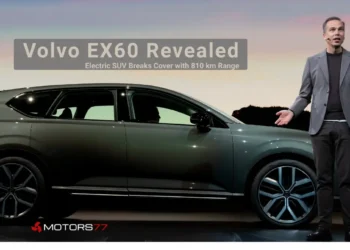Suzuki has unveiled its Vision e-Sky BEV concept at the Japan Mobility Show 2025, marking a significant step in the automaker’s electric vehicle journey. This compact battery-electric vehicle (BEV) concept offers a glimpse into Suzuki’s vision for affordable, practical urban electric mobility, with plans for commercialization within fiscal year 2026.
Suzuki Vision e-Sky BEV Concept : Designed for Everyday Life
The Vision e-Sky has been developed with a clear purpose: to serve as the perfect companion for daily commuting, shopping trips, and short weekend getaways. Built around the theme of “Unique, Smart, Positive,” this minicar concept is tailored specifically for customers who rely on compact vehicles as their primary means of transportation in urban and suburban environments.

Compact Dimensions, Maximum Efficiency
Staying true to Japan’s kei car regulations, the Vision e-Sky maintains impressively compact dimensions:
- Length: 3,395 mm
- Width: 1,475 mm
- Height: 1,625 mm
These dimensions keep it within Japan’s strict minicar limits while adopting a tallboy layout that maximizes interior cabin space within its compact footprint. To put this in perspective, the Vision e-Sky is taller than the Maruti Suzuki S-Presso but shorter and narrower, making it ideal for navigating tight city streets and parking spaces.
Impressive Range for Daily Use
One of the standout features of the Vision e-Sky concept is its practical electric range. Suzuki has confirmed that the vehicle will offer a driving range exceeding 270 kilometers (approximately 168 miles) on a single charge. This range is more than adequate for typical daily commutes, errands, and weekend excursions, addressing one of the key concerns potential EV buyers have about range anxiety.

Production Timeline
Suzuki isn’t just showcasing a distant dream. The automaker has announced plans to bring the Vision e-Sky to mass production within fiscal year 2026, making it one of the most anticipated compact EVs in the near future. This timeline demonstrates Suzuki’s commitment to entering the electric vehicle market with a practical, affordable solution.
Could This Be India’s WagonR EV?
Given the Vision e-Sky’s dimensions and positioning, speculation is rife that this concept could serve as the foundation for an electric version of the popular WagonR for markets like India. The size comparison with the Japanese WagonR and its focus on practical, everyday mobility make it a strong candidate for electrification of one of Suzuki’s most successful nameplates.

Part of Suzuki’s Broader Electric Strategy
The Vision e-Sky doesn’t stand alone in Suzuki’s electric vehicle plans. The company is also showcasing the e EVERY CONCEPT at the Japan Mobility Show 2025, a mini-commercial battery-electric van developed jointly with Daihatsu Motor Co. and Toyota Motor Corporation. This demonstrates Suzuki’s multi-faceted approach to electrification across different vehicle segments.
Additionally, Suzuki has already introduced the e VITARA in Europe, a larger BEV featuring the “Emotional Versatile Cruiser” concept with advanced features like the ALLGRIP-e electric 4WD system.
Design Philosophy: Joyful and Practical
While detailed interior specifications haven’t been fully revealed, Suzuki has emphasized that the Vision e-Sky will feature a design that evokes joy and nimbleness. The concept promises easy-to-use luggage space and straightforward operation, making it accessible to drivers of all experience levels.
The exterior design communicates both modernity and approachability, avoiding the overly futuristic styling that can sometimes alienate traditional customers while still clearly signaling its electric powertrain.

The Growing Small EV Market
The Vision e-Sky arrives at a time when interest in small, affordable EVs continues to grow globally. As cities become more congested and environmental regulations tighten, compact electric vehicles like the Vision e-Sky offer an attractive solution that combines zero-emission mobility with practicality and affordability.
In markets like Japan, where kei cars dominate due to tax incentives and practical considerations, an electric kei car could be particularly appealing. For other markets, including India, where Suzuki has a strong presence through Maruti Suzuki, the Vision e-Sky concept could pave the way for accessible electric mobility for millions of customers.
What to Expect Next
As the Japan Mobility Show 2025 progresses, more details about the Vision e-Sky’s specifications, features, and pricing strategy are expected to emerge. The automotive community will be watching closely to see how Suzuki positions this vehicle in terms of pricing, charging capabilities, and available features.
With commercialization planned for fiscal 2026, potential customers won’t have to wait long to see this concept transform into a production reality. The Vision e-Sky represents Suzuki’s answer to the question: “Can electric vehicles be both practical and affordable for everyday drivers?” Based on what we’ve seen so far, the answer appears to be a resounding yes.
Conclusion
The Suzuki Vision e-Sky BEV concept represents a thoughtful approach to electric mobility, prioritizing practicality, affordability, and real-world usability over flashy specifications. As Suzuki moves closer to production, this compact EV could very well become a game-changer in markets hungry for accessible electric transportation.
Whether it arrives as the electric WagonR for India or under a new nameplate, the Vision e-Sky demonstrates that the future of electric mobility doesn’t have to be expensive or complicated—it just needs to fit seamlessly into our daily lives.










